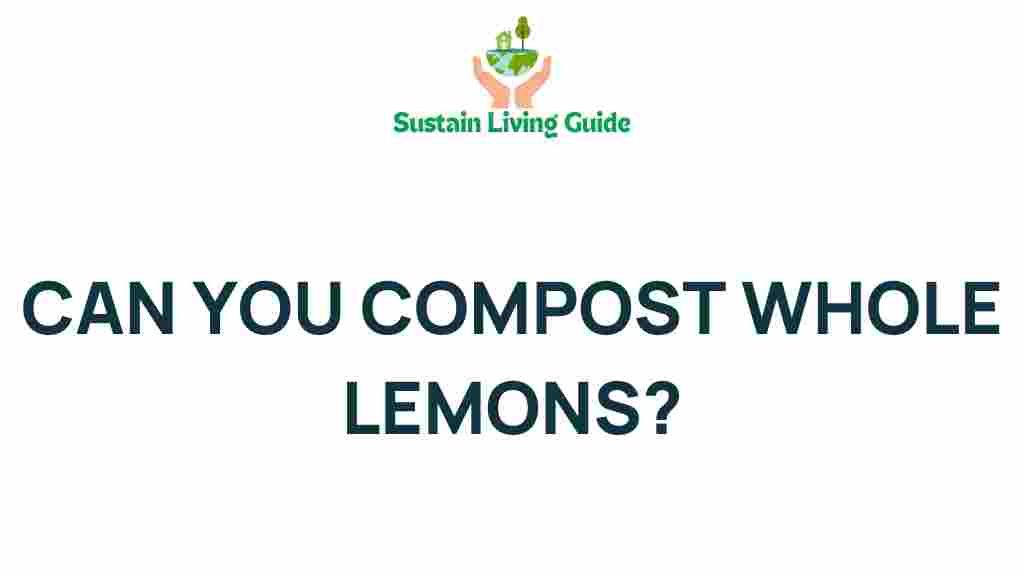Can You Really Compost Whole Lemons? The Surprising Truth Revealed
Composting is an eco-friendly practice that allows us to recycle organic waste into nutrient-rich soil. As we become more conscious of our environmental impact, many people are exploring what can and cannot be composted. One question that frequently arises is: Can you really compost whole lemons? In this article, we will delve into the surprising truth about composting lemons, their benefits, and tips for successful composting.
Understanding Composting
Before we dive into the specifics of composting lemons, it’s essential to understand what composting is and how it works. Composting is the process of breaking down organic materials, such as food scraps and yard waste, into a rich soil amendment known as compost. This process involves microorganisms, fungi, and insects that decompose organic matter, turning it into a valuable resource for gardens and landscaping.
Benefits of Composting
- Reduces Waste: Composting diverts organic waste from landfills, reducing overall waste and greenhouse gas emissions.
- Nutrient-Rich Soil: Compost enhances soil quality, providing essential nutrients for plant growth.
- Water Retention: Compost improves soil structure, promoting better water retention and drainage.
- Environmental Impact: Composting contributes to a sustainable environment by recycling nutrients and reducing the need for chemical fertilizers.
Can You Compost Whole Lemons?
The answer to whether you can compost whole lemons is a bit nuanced. While you technically can compost them, there are several factors to consider. Whole lemons contain a tough rind and a high acidity level that can affect the composting process.
Benefits of Composting Lemons
Despite the challenges, composting whole lemons has its benefits:
- High in Nutrients: Lemons are rich in potassium, phosphorus, and nitrogen, which can enrich your compost.
- Attracts Microorganisms: The sugars in lemons can attract beneficial microorganisms, aiding the composting process.
- Adds Citrus Oils: The oils in lemon peels can deter pests and add a pleasant scent to your compost pile.
Considerations for Composting Whole Lemons
Before tossing whole lemons into your compost pile, there are a few considerations to keep in mind:
- Acidity: Lemons are acidic, which can alter the pH balance of your compost. It’s essential to balance this acidity with alkaline materials.
- Decomposition Time: Whole lemons may take longer to decompose compared to smaller, chopped pieces.
- Pests: If not managed properly, citrus peels can attract pests and create odor issues in your compost pile.
Step-by-Step Guide to Composting Whole Lemons
If you’re ready to compost whole lemons, follow these steps for best results:
- Gather Your Materials: Collect your kitchen scraps, yard waste, and organic materials along with your whole lemons.
- Chop the Lemons: For faster decomposition, consider chopping the lemons into smaller pieces. This increases the surface area and speeds up the composting process.
- Balance the Ingredients: Ensure a proper balance of green (nitrogen-rich) and brown (carbon-rich) materials. Aim for a ratio of 2:1 or 3:1, respectively.
- Layer Your Compost: Alternate layers of green and brown materials in your compost pile. Add the chopped lemons in between layers to help with decomposition.
- Maintain Moisture: Keep your compost pile moist, similar to a damp sponge. If it’s too dry, add water; if it’s too wet, add more brown materials.
- Turn the Pile: Regularly turning your compost pile aerates it and speeds up the decomposition process. Aim to turn it every few weeks.
- Monitor Temperature: A healthy compost pile will heat up due to microbial activity. Ensure it reaches a temperature of 130°F to 160°F (54°C to 71°C) to kill off pathogens and weed seeds.
- Harvest Your Compost: When your compost is dark, crumbly, and has a pleasant earthy smell, it’s ready to use. This process typically takes a few months.
Troubleshooting Tips for Composting Lemons
Even with the best intentions, composting can sometimes lead to challenges. Here are some troubleshooting tips:
- Odor Issues: If your compost smells bad, it may be too wet or have an imbalance of greens and browns. Add more browns and turn the pile to aerate it.
- Pest Problems: To deter pests, bury your citrus scraps deep within the pile and ensure your compost is well-aerated.
- Slow Decomposition: If your lemons aren’t decomposing, try chopping them into smaller pieces and adding more nitrogen-rich materials.
What Not to Compost
While composting can include many organic materials, some items should never be composted. Avoid adding:
- Meat, fish, and dairy products
- Oils and fats
- Diseased plants or weeds
- Chemically treated wood
- Pet waste
Alternative Uses for Whole Lemons
If you decide that composting whole lemons isn’t the best option for you, consider these alternative uses:
- Citrus Cleaner: Use lemon juice mixed with vinegar as a natural cleaner for your home.
- Flavor Enhancer: Squeeze lemon juice into your dishes, drinks, or desserts for added flavor.
- Natural Deodorizer: Place whole lemons in your refrigerator or pantry to absorb odors.
For more composting tips and tricks, check out this helpful resource.
Conclusion
In conclusion, composting whole lemons is indeed possible, but it requires careful consideration and management. Their nutrient-rich properties can benefit your compost pile, but be mindful of their acidity and potential pest issues. By following the steps outlined in this article and troubleshooting common problems, you can successfully compost lemons and contribute to a healthier environment. Remember, composting is not just about reducing waste; it’s about creating a sustainable cycle that nourishes our soil and, ultimately, our planet.
For further reading on composting and sustainability, you can visit the EPA’s composting page.
This article is in the category Eco-friendly and created by SustainLivingGuide Team

3 thoughts on “Can You Really Compost Whole Lemons? The Surprising Truth Revealed”